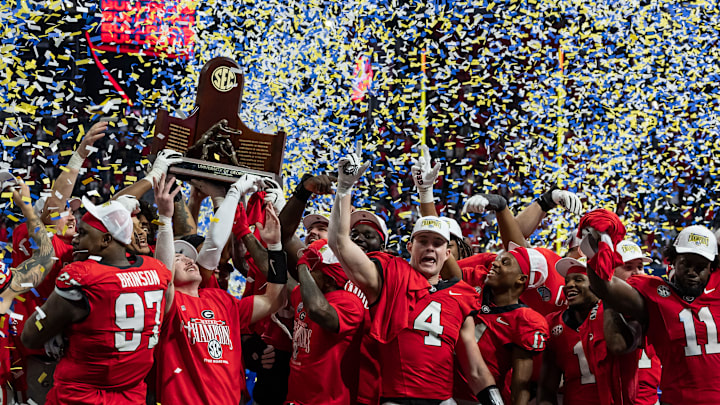College football has always been a sport rooted in tradition, but make no mistake—massive changes are on the horizon.
The landscape is shifting at a rapid pace, and whether fans love or hate the direction things are heading, the future is becoming clearer by the day. The SEC and Big Ten are wielding more power than ever, the Playoff is expanding, and the structure of the sport as we know it is evolving into something entirely new.
Here are five inevitable changes that are coming to college football, whether you like them or not.
Inevitable changes that are on the horizon for college football
1. All conferences are going to play 9 games
The debate over an eight-game vs. nine-game conference schedule has been ongoing for years, but the clock is ticking on any league still holding onto the eight-game model. The Big Ten and Big 12 have already shifted to a nine-game slate, and we expect that it won't be much longer before the SEC also makes this change, forcing the ACC's hand, as well.
A longer conference schedule accomplishes two things: it maximizes TV revenue by delivering better matchups every week, and it reduces the number of “cupcake” games that frustrate fans and networks alike. The move to nine games will also help set clearer criteria for Playoff qualification, particularly as automatic bids become a larger part of the equation.
For teams used to coasting through an easier non-conference schedule, this change will be brutal. But the reality is, in the new era of college football, conferences are going to play more, regardless.
2. Conference championship weekend will be an extension of the CFP
As the College Football Playoff expands, the importance of conference championship games is about to be redefined. Instead of simply determining league champions, these games will essentially serve as the first round of the Playoff.
In a 16-team CFP model, automatic bids for Power Four champions are a near certainty, and in many cases, the games played during this weekend will determine whether a team gets in or is left out. This also means that teams that might have previously treated their conference championship as a final goal will now have to view it as just another step in the postseason gauntlet.
We expect that — if the discussed 4-4-2-2-1 model is put into place — the SEC and Big Ten will have play-in games for their spots, and we'd expect that the ACC and Big 12 will likely give their champion the week off with the No. 2 and No. 3 seeded teams from the regular season battle it out for their second automatic-qualifying bid.
3. Many non-conference games are going to be canceled
With the move to a nine-game schedule and an expanded Playoff, non-conference matchups will take a major hit. Sure, we’ll still see some high-profile games early in the season, but for many programs, these matchups will become far less common.
The SEC and Big Ten are already pushing for a scheduling alliance that would see their teams face each other in non-conference play, which could eliminate many longstanding rivalries and replace them with matchups driven by TV contracts rather than tradition.
Rivlaries like Clemson vs. South Carolina, Florida vs. Florida State, and Georgia vs. Georgia Tech could all be in jeopardy. We'd especially think that non-conference games that are scheduled outside of the SEC-Big Ten alliance (ie. an ACC vs. SEC matchup or a Big 12 vs. Big Ten matchup) will be axed.
4. The College Football Playoff is going to expand to 16 teams (if not more)
College football’s postseason is only getting bigger. While the Playoff moved to 12 teams in 2024, the momentum behind a 14-team or 16-team expansion is already building. The SEC and Big Ten are expected to push for even more automatic bids, and once the system expands again, don’t be surprised if it doesn’t stop at 16.
A larger Playoff means more money, more games, and more teams staying in the hunt longer into the season. But it also means the regular season will lose some of its do-or-die urgency. The days of a single September loss knocking a team out of championship contention are coming to an end.
For better or worse, college football’s postseason is going to start looking a lot more like the NFL’s, with multiple rounds and pathways to the title. Purists may hate it — and trust me, we do — but expansion is happening, and there’s no going back.
5. The SEC and Big Ten will form a New World Order starting in 2031
The biggest shift in college football history is still on the horizon. By 2031, the sport could be unrecognizable, as the SEC and Big Ten finalize their takeover. With teams like Clemson and Florida State expected to have a clearer path to escape the ACC’s grant of rights, a complete reimagining of the sport is likely.
2031 also marks the year that the SEC, Big Ten, and Big 12 will be up for new contract negotiations. You can expect that both the SEC and Big Ten will be in the market for expansion teams to make get the best deal possible and that might even mean something else controversial: Cuts.
We’re heading toward a future where the SEC and Big Ten function as their own super league, dictating the direction of the sport while leaving behind programs that don’t bring in enough revenue. Schools like Vanderbilt and Northwestern—longtime members of these powerhouse conferences that simply don't bring in TV ratings—could find themselves pushed out in favor of bigger brands that bring more value to television deals.
